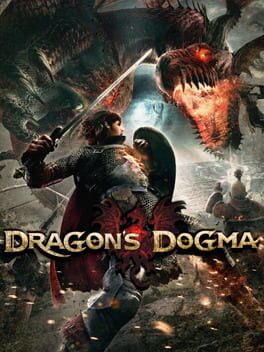This game is four or five brilliant ideas crammed into an ill-fitting Skyrim suit. The pawn-based AI party system is really cool, and the fights that really take advantage of it to have different party members focusing on different tasks are really fun. Climbing on bosses, pulling them off-balance, and focusing different body parts for different effects makes them feel challenging and exciting in a totally different way than action games in the Dark Souls lineage.
The moment-to-moment melee combat is also fascinating. In addition to reactive moves like parries and a dodge attack that gives a bonus if you perfect dodge (prefiguring Final Fantasy XVI), even the basic combo has a rhythm component to it: depending on the tempo of your button presses, you can keep comboing light sword swipes move into a medium finisher, or go for a heavy attack into a longer sequence of damaging strikes.
I discovered all of this within the first few minutes of playing the game, and I was over the moon. If this was the basic combat, imagine what it would look like at an advanced level! But sadly, that didn't pan out. The rhythm components I mentioned above are all there is; there's no complexity to the basic attacks beyond that. And outside of boss fights, the encounter design is entirely structured around throwing tons of mobs at you at once, so all the interesting reactive skills become largely irrelevant and AOEs become the order of the day. By the middle of the game, moving through the overworld became a slog of mob fight after mob fight—unavoidable because you have no direct control over your party—and desperately juggling inventory between the party to avoid overencumbering yourself.
This is the sort of game that was always destined to be a cult classic. It fights with its own goals too much to be a true masterpiece, but its moments of genius are still largely unexploited by the games that have come out since its release. It's left me very excited to see what they do with the sequel.
The moment-to-moment melee combat is also fascinating. In addition to reactive moves like parries and a dodge attack that gives a bonus if you perfect dodge (prefiguring Final Fantasy XVI), even the basic combo has a rhythm component to it: depending on the tempo of your button presses, you can keep comboing light sword swipes move into a medium finisher, or go for a heavy attack into a longer sequence of damaging strikes.
I discovered all of this within the first few minutes of playing the game, and I was over the moon. If this was the basic combat, imagine what it would look like at an advanced level! But sadly, that didn't pan out. The rhythm components I mentioned above are all there is; there's no complexity to the basic attacks beyond that. And outside of boss fights, the encounter design is entirely structured around throwing tons of mobs at you at once, so all the interesting reactive skills become largely irrelevant and AOEs become the order of the day. By the middle of the game, moving through the overworld became a slog of mob fight after mob fight—unavoidable because you have no direct control over your party—and desperately juggling inventory between the party to avoid overencumbering yourself.
This is the sort of game that was always destined to be a cult classic. It fights with its own goals too much to be a true masterpiece, but its moments of genius are still largely unexploited by the games that have come out since its release. It's left me very excited to see what they do with the sequel.
